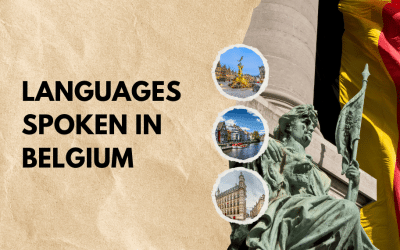What does the word quadrilingual mean? Who is a quadrilingual person?
Ever-increasing globalization has turn multilingualism into one of the most useful skills one could possess.
Moreover, being a polyglot is a desirable trait that offers you economic, social, and intellectual advantages. There aren’t many other skills out there that can be as beneficial to you as being fluent in a language.
This is the main reason why many parents decide to raise their children bilingual or multilingual. In fact, 80% of Americans claim that they want their child to be able to speak at least one foreign language fluently before graduating from high school.
However, as the world becomes increasingly globalized and as learning a language becomes easier with all the tools and apps existing on the world wide web, being bilingual is not enough.
Indeed, nowadays we see more and more people being able to speak fluently in three or even four languages.
In the following blog, you will get acquainted with a new term from the sphere of languages and namely, “quadrilingual”. You will learn more about its origin, the benefits of being quadrilingual, and many other interesting facts!
1. Etymology and meaning of the word “quadrilingual”

“Quadrilingual” is a compound word, consisting of two parts:
1. “quadri-“, meaning “four” in Latin
2. “-lingual”, an adjective-forming element relating to language or linguistic competence, esp. with the sense ‘speaking or involving the number of languages indicated by the first element’(OED)
According to OED, the word stems from post-classical Latin – “quadrilingual” means “written, printed, etc., in four languages” or “using or able to use four languages”.
Although the form of the word has changed to “quadrilingual”, it has kept its meaning pretty much the same.
It could be used in the sense of “written in four languages” as in the sentence: A quadrilingual translation of the Bible.
Also, “quadrilingual” could mean “being able to speak 4 languages”. For instance, we could say that someone is “a quadrilingual interpreter”, which means that this person is able to translate content into four languages.
Pronunciation of “quadrilingual”
In terms of pronunciation, the Americans would pronounce “quadrilingual” as /ˌkwɑdrəˈlɪŋɡwəl/ while British people like so: /ˌkwɒdriˈlɪŋɡw(ə)l/.
History of the word “quadrilingual”
According to OED, “quadrilingual” appeared for the first time in 1846 and was used to describe a quadrilingual psalter which was printed in Hebrew, Chaldee, Greek, and Latin.
Only later, in 1969 the word was used for the first time to refer to a person. You can have a look at the examples from OED below:
1846 (W. Hazlitt tr. L. Bossi in W. Roscoe Life Leo X I. 478) The Quadrilingual Psalter, printed in Genoa by Porro, comprises the Hebrew, Chaldee, Greek, and Latin texts.
1969 (Internat. Herald Tribune 6 Nov. 14/2 (advt.)) Young American, excellent education U.S.A.-Europe, Ph.D. quadri-lingual, well-traveled, seeks position.
1996 (Economist 30 Mar. 50/2) Quadrilingual Switzerland values its success in avoiding linguistic strife between its various parts.
2. Quadrilingual vs Multilingual vs. Polylingual
While “quadrilingual” refers strictly to a person speaking exactly four languages, both multilingual and polylingual have a much broader meaning.
These are umbrella terms that could be used to denote a person speaking 3 languages (trilingual) as well as somebody who is fluent in 10.
However, multilingual is usually used in the sense of knowing many languages, which is pretty general. Indeed, multilingual could be used as a synonym to bilingual, trilingual, etc.
Polylingual, although means being able to speak many languages, is primarily used to refer to people knowing more than 2 languages.
Following the pattern of “quadrilingual” we could create a long list of words, denoting people being able to speak 2, 3, 4, 5, etc. languages:
- Monolingual (Speaks 1 language)
- Bilingual (Speaks 2 languages)
- Trilingual (Speaks 3 Languages)
- Quadrilingual (Speaks 4 Languages)
- Pentalingual (Speaks 5 Languages)
It is important to note that all these terms do not explicitly show the proficiency of the speaker. They could simply refer to a person who is able to use these languages or to a native speaker all the same.
3. Challenges of being quadrilingual

Learning a language is not an easy job, but it might seem like a mission impossible when it comes to learning four!
Undoubtedly, the biggest challenge would be time. Learning a language fluently usually takes at least a year and if we have to be realistic, we are all busy bees who have a lot going on in our lives – it could be work, university, or just a long list of chores, so we cannot devote a big part of our time to learning a language.
Sadly, sometimes the lack of time rather than lack of motivation stops us from learning a language.
On the other hand, some people do have some free time to learn a language but are afraid to take up learning a language because they don’t know how long it might take to master it.
In fact, The FSI, US Foreign Service Institute, has managed to group languages into a different group depending on their difficulty for English native speakers:
- Group 1: 24-30 weeks (600-750 class hours)
French, German, Indonesian, Italian, Portuguese, Romanian, Spanish, Swahili
- Group 2: Approximately 36 weeks (900 class hours)
Bulgarian, Burmese, Greek, Hindi, Persian, Urdu
- Group 3: Approximately 44 weeks (1100 class hours)
Amharic, Cambodian, Czech, Finnish, Hebrew, Hungarian, Lao, Polish, Russian, Serbo-Croatian, Thai, Turkish, Vietnamese
- Group 4: 88 weeks (2200 class hours)
Arabic, Chinese, Japanese, Korean
Of course, these numbers are only approximate and cannot give you an exact idea of how much time you actually need to learn a language.
Also, these numbers do not take into consideration variables such as learner’s motivation, methods, attentiveness, etc.
Also Read: Mistakes Linguists Make in Korean to English Translation
4. Benefits of being quadrilingual
Although learning a language can take a long time, it is definitely worth the effort!
We could generally say that the benefits of being multilingual can be separated in three main categories: professional, cultural, and mental benefits. Have a look at the lists below:
1. Professional benefits
- Having better competitiveness in the job market
- Making your resume stand out
- Becoming a versatile employee, capable of navigating diverse cultural expectations
- Establishing better rapport with foreign employers, clients, and other stakeholders
2. Mental benefits
- Greater cognitive flexibility as one learns to express similar ideas in multiple ways
- Better creative problem-solving skills as one learns to perceive situations in different ways
- Improved brain functions such as better attention focus
- Efficient and easy processing of information
- Better multitasking abilities
- The slower decline of cognitive abilities such as delay of dementia and Alzheimer’s disease
3. Cultural benefits
- New social opportunities such as meeting new people and engaging in conversations with locals
- A better understanding of the nuances of another culture
- Cheaper travel as you don’t need tour groups and guides to translate for you
- The direct and immersive experience of the local culture as you don’t need the help of a translation
- Better self-perception as you begin to see yourself through the lenses of a new culture
5. Famous people who are quadrilingual or multilingual
- Natalie Portman

Natalie Portman is not only an A-list actress and a UN Ambassador, but also a polyglot. She moved from Jerusalem to the US when she was only 3 years old and learned Hebrew at school. The famous actress is also fluent in Spanish, German and Japanese!
- Tom Hiddleston

The famous English gentleman is allegedly able to speak 9 languages, but he’s fluent in only four of them: English, Spanish, Greek, and French. He claims that whenever he travels, he tries to speak in the local language to improve his fluency.
- Sandra Oh

Dr. Yang from Grey’s anatomy is a quadrilingual speaker in real-life! The actress Sandra Oh grew up in a Korean family and spent her childhood in Ottawa, Canada where the official languages are both English and French.
Clearly, the actress has been surrounded by multiple languages since day one. She is also fluent in Spanish, which turns her into yet another quadrilingual celebrity!
- Jodie Foster

Jodie Foster has acted in French films and even dubbed some of her films in French. This is by no way a coincidence since she has attended a French-speaking prep school in Los Angeles.
Thus, is able to speak the language of love perfectly! She didn’t stop there with learning languages – the 2 times Oscar winner can get by Spanish, Italian, and German!
- Christoph Waltz

If you have watched Quentin Tarantino’s film “The Inglorious Basterds” you might have noticed how Walz’s character, the Austrian SS officer Colonel Hans Landa, effortlessly switches between English, German, French and Italian.
In real life, although the Austrian actor is not completely fluent in Italian, he speaks German, French, and English perfectly. He even dubs his own movies in French!
- Audrey Hepburn

Interestingly, Andrey Hepburn grew up in a very international setting – she was born in Belgium to a mother of Dutch origin and an Austrian-British father.
Moreover, she was raised speaking English as a mother tongue, but while living in the Netherlands, she picked up some Dutch.
When the Nazis occupied Holland during WWII, she changed her name to the Dutch-sounding Edda van Heemstra to hide her English roots. During her life, she also learned Italian, Spanish, and French.
My experience as a quadrilingual
To finish off, I would like to say a few words about my personal experience as a quadrilingual.
My native language is Bulgarian and when I was 8 years old, I started learning English at school. Later on, I attended a foreign language high school where I had the chance to learn English and German at an advanced level.
Currently, I am living and attending university in Vienna, Austria. A year ago I started learning Russian and this is when my quest to becoming quadrilingual began!
As you can see, language learning has always been at least a subject from my curriculum and in some way, foreign languages have always had a place in my life.
As a child, I found learning languages very hard, but somewhere around the time I went to high school, I realized how much I actually love languages.
I truly believe languages are a treasure of their own. Let aside all the professional, cognitive, and cultural benefits they could give you.
Languages are much more than that! I believe that learning a language can open your eyes to a new perspective of the world.
I am currently learning Russian, and I feel like I am constantly expanding my understanding of the world!
All in all, becoming multilingual is not a destination and it shouldn’t be regarded as such. You don’t just learn a language; you experience it.
Becoming multilingual is a journey that could take you to places you never know existed and all this without moving from the comfort of your own home!
Also read: Reaching a Global Audience with QR codes




